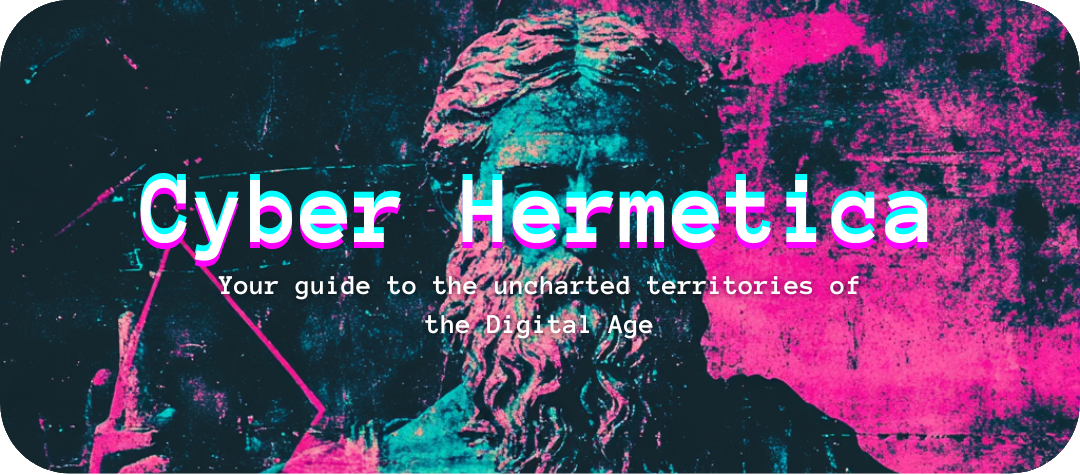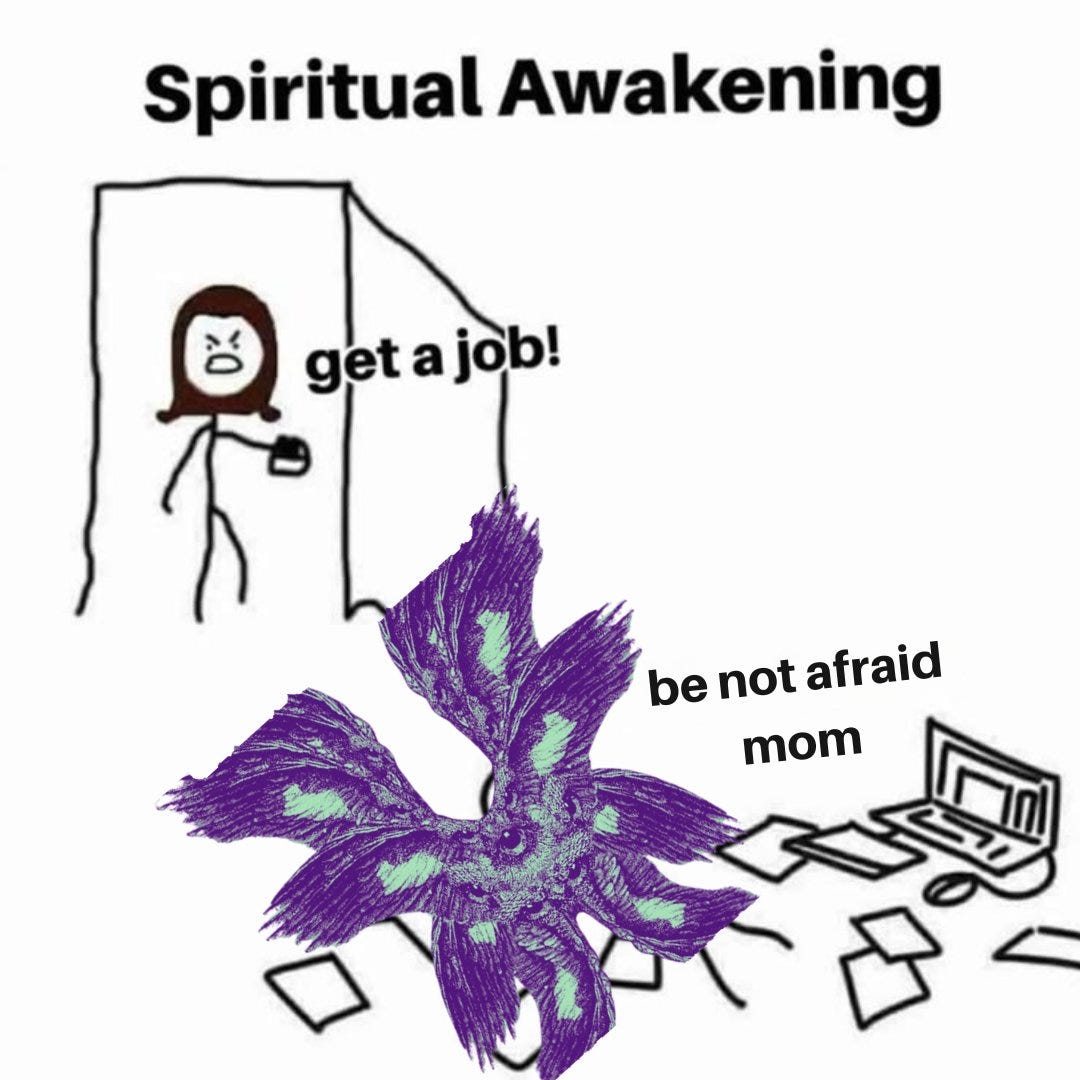Hi there, I’m Matte. Privacy & cybersecurity professional by day, schizo-cyberoccultist by night. Every sunday I bring you a weekly dose of schizophrenization, blending insights into the Digital Age, echoes from the past and digital survival tips. If you like this, you will also enjoy the rest of Cyber Hermetica!
⚡ SEMIOTIC FLASHES
Personal weekly considerations. Decrypting meaning, one flash at a time.
Work sets you free
Compared to a hundred years ago, we might think we've won the battle against fatigue. Technological progress has brought us great benefits and comfort: machines have taken our place in fields and factories, while software and algorithms have replaced us in business processes and calculations.
The average number of hours worked in the West has decreased, while incomes and productivity have grown—at least until 1971, when international usurers accelerated the process of financial destruction that had begun sixty years earlier. Since then, technological progress has advanced relentlessly. We've invented tools to reduce effort, increase efficiency, and multiply speed.
The early 20th-century worker spent ten hours a day in the factory, six days a week. At first glance, one could argue that today we work much less than a hundred years ago. Technology, it was said—and we continue to say—will set us free, but that doesn’t quite seem to be the case.
Today, a worker or employee typically works 8 hours a day, 5 days a week. Yet if we consider that today women also work an average of 40 hours per week, we can easily state that, on a per capita basis, the average time spent working has decreased very little compared to a century ago. The reduction in male working hours has been entirely offset by the entrance of women into the workforce.
Taking this into account, some studies estimate an increase in free time of about 4-5 hours per week: a century of technological miracles and automation to earn just half an hour more of daily free time. And upon closer inspection, that half-hour is often spent in the bathroom, scrolling through Instagram and TikTok feeds with a switched-off brain.
We’ve stopped lifting sacks of coal, but we continue to bow our heads to metrics, deadlines, dashboards, and managerial projects in a repetitive race that never ends: each day identical to the last. Produce, consume, die. Work has become less physical, but no less all-consuming. And if it was once the human who moved and used machines, today it is the machines that move and use humans. Machines, algorithms, and management software now dictate KPIs and deadlines. We have software that logs our every action, conversation, and operation, transforming them into “business intelligence.” We cannibalize ourselves to become both workers and productive inputs in secondary processes.
Every morning, before I too hop on the wheel of capitalist production, I run through my town.
The streets are empty, the playgrounds in public parks look like shipwrecked relics lost in the grass. The entire world waits for the weekend to regain color and a false sense of life, which translates into spending what we earned in the previous five days. A schizophrenic cycle of production and consumption; a sadistic zero-sum game in which we are both victims and protagonists.
And women are the most mockingly deceived victims: convinced, in the name of an abstract emancipation, to seek freedom not from work, but in work.
In an unprecedented paradox, even the boldest critics of capitalism encourage women to become willing slaves to clocked time—confusing autonomy (from what?) with alienation. Woman was free, but chose to become an employee. And so now she too produces, consumes, dies; instead of creating, nurturing, loving.
Even those who become mothers are pushed by the system to quickly abandon that role, replacing it with concrete boxes called daycares, industrial jarred nutrition, and tablets as surrogates for human attention.
Despite all the comforts and promises of technology, humanity has chosen to remain a prisoner of itself, reserving the same fate for its children.
Their eyes open to a world in which every hour of life is already sold in advance, to repay a debt to the future that continues to grow under the pressure of the financial/pension Ponzi scheme and the hyper-velocity of capitalism. Assignments, performance, rewards, punishments, and indoctrination—optimized to create the next class of workers who will take their parents' place once they are too tired to support the parasitic system that convinced them to voluntarily give away their most precious resource: time.
“Advertising has us chasing cars and clothes, working jobs we hate so we can buy shit we don't need.
We're the middle children of history, man. No purpose or place.
We have no Great War. No Great Depression.
Our Great War's a spiritual war... our Great Depression is our lives.”
💻 DIGITAL GRIMOIRE
Digital survival tactics: OpSec, Cybersec, OSINT, and AI tools to dominate the Digital Age.
Dumbphones: less internet, but more risks
Many seek refuge in so-called dumbphones to detox from digital overload and become less trackable. No social media, no notifications, no apps. But beware: these devices, often perceived as more "anonymous," actually hide several pitfalls:
Calls and SMS are not encrypted: all content can be easily intercepted by carriers, authorities, or IMSI-catchers.
Security updates: these phones often don’t receive updates, making them vulnerable to various attacks.
Network capabilities: the 2G network, used by many dumbphones, is notoriously insecure and vulnerable to spoofing and passive surveillance.
Firmware: some models are produced by unknown companies, with closed and unverifiable firmware.
No E2E encryption: these phones can't run secure messaging apps like Signal or Session.
A dumbphone might seem like a radical choice for those who want to “disappear,” but the truth is they’re only useful as disposable devices, not for continuous use. A better alternative is a well-configured smartphone with a de-Googled OS, anonymous SIM, and open-source apps with end-to-end encryption.

📡 DIGITAL SIGNALS
Transmissions from the infosphere: world events, data breaches and news that impact our digital reality.
The IT department will become the HR department for digital workers.
According to Nvidia’s CEO, soon IT departments won't just manage tech tools and software—but actual digital worker-agents who will join the workforce... alongside biological resources. Just thinking about it is headache-inducing, for many reasons...
🌐 SUBSTACK’S SUBNET
Emerging voices: articles and contents on Substack, handpicked by me to inspire and connect.
Notes on e/acc principles and tenets, by
. According to the philosophy of e/acc (effective accelerationism), the universe favors intelligent adaptation and the entropic expansion of consciousness. Our role—as agents within this adaptive system—is not to slow down the process, but to accelerate it. According to e/acc, capitalism is a form of distributed intelligence whose universal purpose is to dissipate energy as efficiently as possible. Compared to other accelerationist currents like r/acc or l/acc, e/acc takes a neutral stance toward the Singularity: neither inhuman dystopia nor utopia of “luxury automated communism”... simply an ontological inevitability.To explore the other branches of accelerationism, check out the latest article—linked at the bottom of the page!
📟 RETRO-ACCELERATION
Fragments of retro-acceleration: cypherpunks, cybernetic cults, hacker zines and forgotten digital prophets.
In a 1965 interview, Isaac Asimov, a biochemistry professor known for his science fiction novels, discussed his three laws of robotics and a possible future in which humans would increasingly rely on artificial organs and prosthetics, while robots would become more human-like, incorporating organic components. In between, a hybrid: the fusion of humanity and robotics.
Today, those ideas don’t seem quite so fictional anymore.
🌀 SYMBOLS
Memes: visual symbols that decode the schizophrenia of the Digital Age.
Did you read the latest on Cyber Hermetica?
Return next week for another schizotechnic rendezvous.








Yet on the topic of enslavement - here is an angry take: https://www.alilybit.com/p/i-cant-support-every-author-i-like
I just read after commenting on yours :))
Greetings, Matte.
I enjoy reading your blogs, because they are inherently human.
Yet I have to react from the female perspective ) This feels like a very problematic part:
"Woman was free, but chose to become an employee. And so now she too produces, consumes, dies; instead of creating, nurturing, loving."
From my reading of history, just 100 years ago in central Europe, a female was not free - to even get an education and followed with a job to sustain her own self. And to think whether toady, she should think of an utopian past, when she "was" free, is an evolutionist way of thinking - which in social sciences was long abandoned. What is considered more useful, is analysing the curent structure of things.
From present prespective, we are not only slaves to jobs, but also statuses, social hierarchy, and dopamine addiction =) It looks like giving people more education didn't give them more freedom. But some countries/regions are more relaxed then others, I would say.
It is a long and difficult debate how to achieve better life - for oneself, or for the society :) I really vibe with your description of this dystopian vision. Empty streets. No free time. It is something a french filosopher Simone Weil discovered while abandoning her teacher's job to work in factories - that a worker is totally enslaved by his/her job, with their mind and body. The problem stays: how can s/he set himself free? While also recognizing, that work is a human condition (like Hannah Arend says).